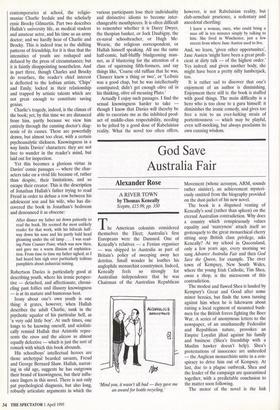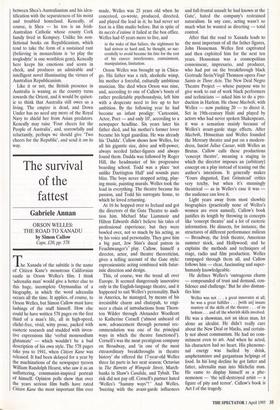God Save Australia Fair
Alexander Rose
A RIVER TOWN by Thomas Keneally Sceptre, £15.99, pp. 330 The American colonists considered themselves the Elect; Australia's first Europeans were the Damned. One of Keneally's relatives — a Fenian organiser — was shipped to Australia as part of Britain's policy of sweeping away her detritus. Small wonder he loathes his anglophile monarchist countrymen. Indeed, Keneally feels so strongly for Australian independence that he was Chairman of the Australian Republican Mind you, it wasn't all bad — they gave me an award for bottle recycling.' Movement (whose acronym, ARM, sounds rather sinister), an achievement mysteri- ously omitted from the biography provided on the dust-jacket of his new novel.
The book is a disguised venting of Keneally's soul (rather than spleen) on the eternal Australian contradiction. Why does a country which conspicuously values equality and `mateyness' attach itself so grotesquely to the great monarchical cherry sitting atop British class privilege, asks Keneally? At my school in Queensland, only a few years ago, every morning we sang Advance Australia Fair and then God Save the Queen, for example. The river town of Kempsey, New South Wales, where the young Irish Catholic, Tim Shea, owns a shop, is the microcosm of this contradiction.
The modest and flawed Shea is lauded by Kempsey's Great and Good after some minor heroics, but finds the town turning against him when he is lukewarm about raising a local regiment of mounted bush- men for the British forces fighting the Boer War. A series of anonymous letters to the newspaper, of an unashamedly Federalist and Republican nature, provokes an Empire Loyalist jihad against his family and business (Shea's friendship with a Muslim hawker doesn't help). Shea's protestations of innocence are unheeded — the Anglican monarchists unite in a con- spiracy to drive him out of Kempsey. At last, due to a plague outbreak, Shea and the leader of the campaign are quarantined together, with a predictable conclusion to the matter soon following.
The motor of the novel is the link between Shea's Australianism and his iden- tification with the separateness of his moist and troubled homeland. Keneally, of course, is Shea — he too is an Irish- Australian Catholic whose county Cork family lived in Kempsey. Unlike his non- fictional books on Republicanism, which tend to take the form of a sustained rant (believing in monarchism is 'to play the troglodyte' is one worthless gem), Keneally here keeps his emotions and scorn in check, and produces an admirable and intelligent novel illuminating the virtues of Australian Republicanism.
Like it or not, the British presence in Australia is waning as the country turns towards the Orient, and it would be quixot- ic to think that Australia still owes us a living. The empire is dead, and Down Under has no need any more of the Royal Navy to shield her from Asian predators. Keneally may raise 'Four cheers for the People of Australia', and, sorrowfully and reluctantly, perhaps we should give 'Two cheers for the Republic', and send it on its way.



























































 Previous page
Previous page